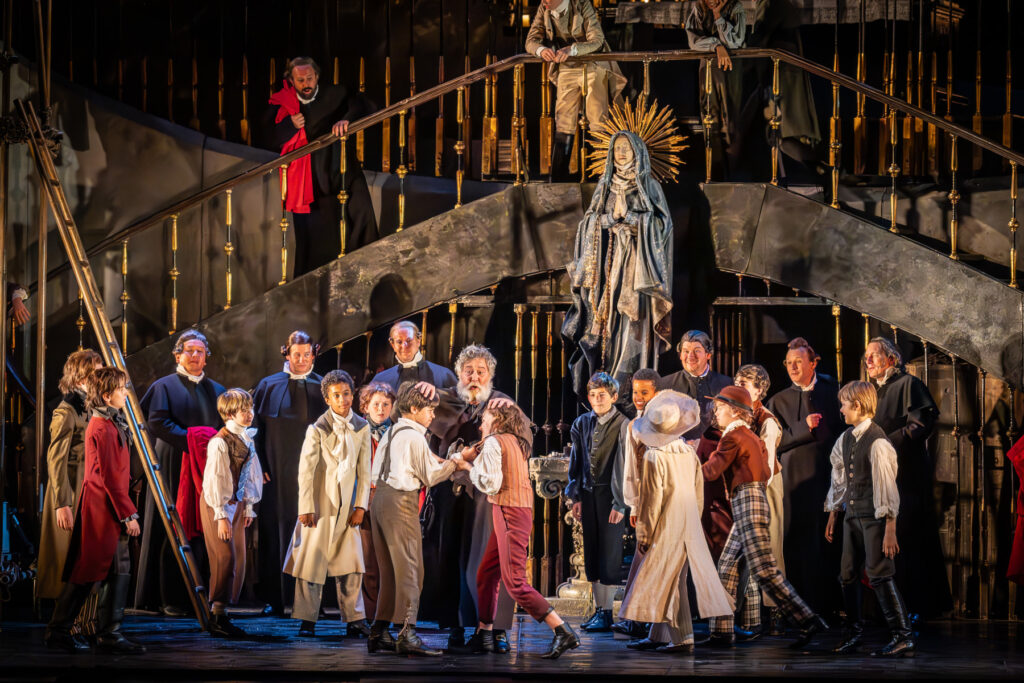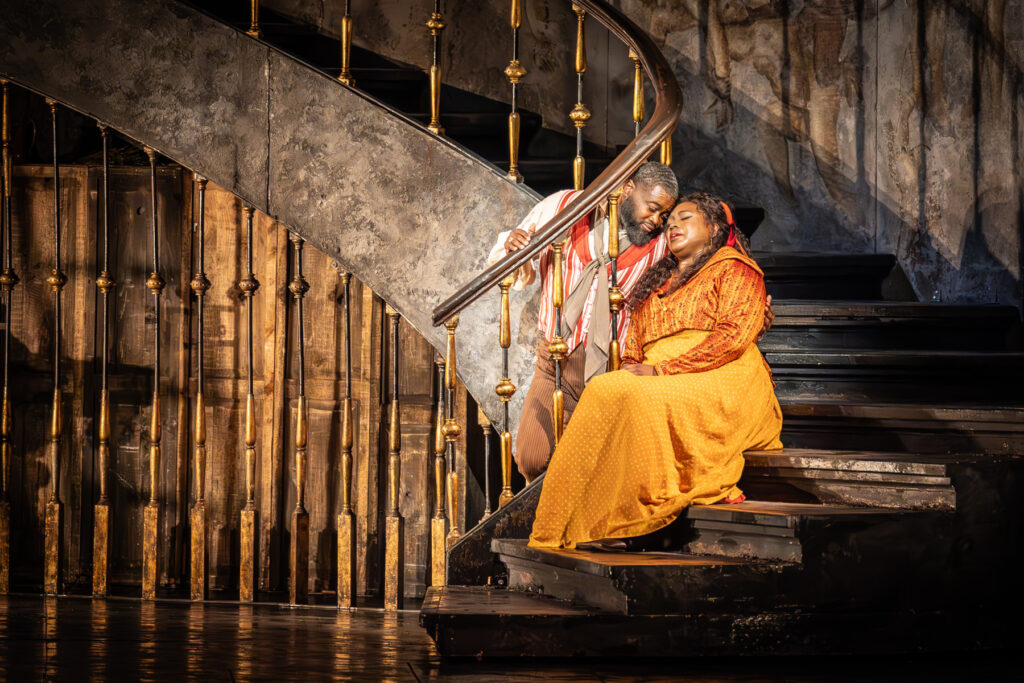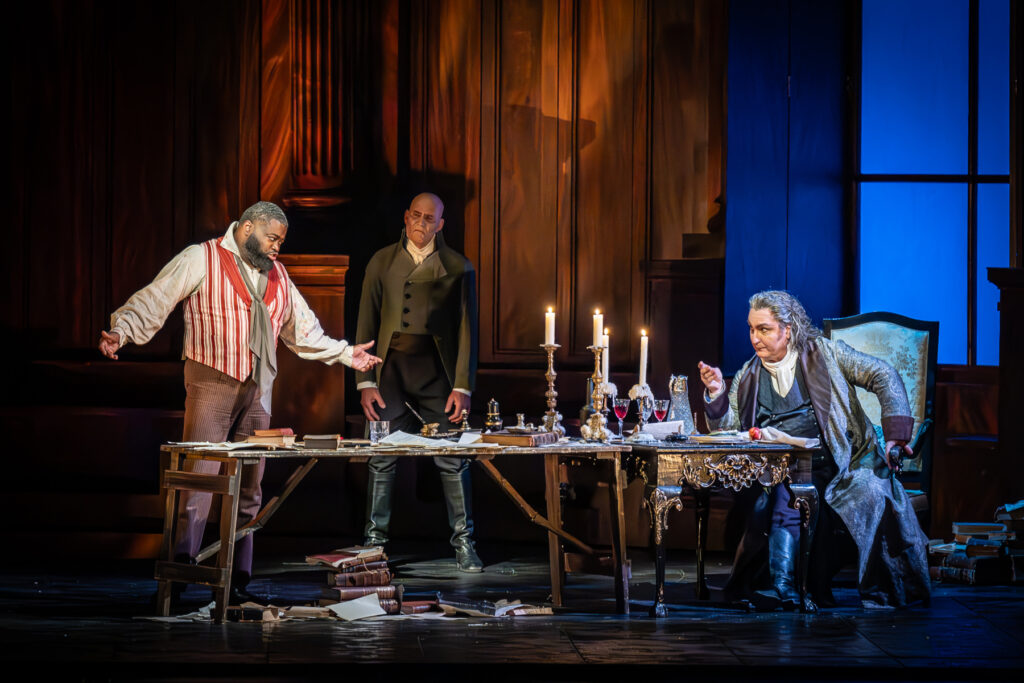The Royal Opera’s venerable production of Tosca – now in its seventeenth revival – is still a great one, but after my third visit in five or so years I did wonder if I could manage a fourth in the future. There was nothing much wrong with the quality of the singing here – rather, Peter Relton’s revival of it (and Mark Henderson’s lighting) distinctly challenged what I saw of it on stage. Having just a week earlier complained in a review about lighting that was too blazingly bright in an opera at the Royal College of Music, I now found myself in exactly the opposite place but with strikingly similar results.
If there is one thing Tosca is not, then it isn’t remotely loose as a work. It’s taut both dramatically and musically – perhaps ruthlessly so. One could argue that Relton’s revival gave you so little to look at (quite literally if the lighting had much to do with it) that he was mercilessly taking away some of the dramatic intent: the Te Deum that closes out the first act was so short on visual impact that we had to rely on what the conductor, Andrea Battistoni, was doing with the orchestra; driven with such sclerotic tone from him it’s unusual to hear it done this way in Puccini. Get to Act III, at the Castel Sant’Angelo, where Puccini has us just before dawn, and Relton/Henderson have us in the depths of midnight – and Battistoni wasn’t really having his way with that, either. I think if one has seen earlier revivals of this production – notably from 2019 or 2022 – one might come away with the impression that Jonathan Kent’s original idea was to have stuck to the vision of striking colour that is in Victorien Sardou’s La Tosca; if your only one was of Peter Relton’s then that idea is rather torn asunder.

Casting in revivals of this production have been uneven in the past; that cannot be said of this one, at least with the Tosca and Cavaradossi. In 2019, with Kristine Opolais and Vittorio Grigolo, I rather felt that the opera should have been rechristened ‘Cavaradossi’ so uneven was it done. Angel Blue and Russell Thomas (both American) were uncommonly well matched, however. It isn’t just that these are two very striking singers with compelling stage presence rather they have a very similar kind of vocal power that plays to both of their dramatic strengths.
I found Angel Blue quite troubling during much of Act I, however. She is, I think, a soprano who needs time to warm up – if there weren’t exactly cracks in the voice, it wasn’t an instrument of great refinement either. One does want some lyricism in a Tosca but here Angel Blue strived for a tone of steel that simply grated far too often. If you wanted notes rounded out, they were instead done with harsh edges. Act II, therefore, was such a surprise because it was magnificent – probably the best of the three from a soprano I have heard at Covent Garden in this production. With less stage diversions here (such as the window shutters repeatedly opening and closing that have sometimes been a problem in other revivals) the focus on Angel Blue’s Tosca and Ludovic Tézier’s Scarpia (never quite the dominant force we get with a baritone like Bryn Terfel) gave her room to amplify the voice with considerable scale and force. If there were drawbacks in the dramatic impulses one could hardly lay them at her door, nor Tézier’s for that matter; one would look to Battistoni for that. Having said that, ‘Vissi d’arte’ was little short of miraculous – richness of tone, depth of feeling and sheer range of colour were magnificent and Battistoni gave her the breadth of pace to do it to perfection, even if he rushed her elsewhere. And rush he sometimes did because one often wanted her long duets with Tézier (still one of the greatest scenes in all opera if done right) to display every possible human emotion.

There were some viperish touches to Blue’s Tosca; I just wish Tézier’s Scarpia had more of the cobra to it. If never a performance that felt entirely short of quality, it wasn’t one that snarled or glowered, terrified or felt predatory. It helped little that Tézier’s baritone isn’t the most enormous and with Russell Thomas’s Cavaradossi so clearly resonating from the dungeons below I was rather reminded of John the Baptist bellowing from the cistern in Richard Strauss’s Salome so compellingly dramatic was the contrast here.
Hearing Russell Thomas’s magnificent voice today it is hard to imagine he was once a lyric tenor – although he does now sing both Parsifal and Otello, beyond the range of most pure lyric tenors. I doubt the depth and dark tones of his voice will appeal to everyone for Puccini’s republican painter but at least no one could deny hearing him – something one would have taken a slight issue with back in 2018 with Joseph Calleja. The burnished richness of this voice is there in spades, as is a precision in the legato. If Battistoni had a tendency to push tempi for Angel Blue (which worked with variable effect) I think he tended to do the opposite for Thomas. If Thomas can certainly reach the top notes he needed the space to get to them – but what might have sounded like an effort to get there was actually the unstoppable crescent of a wave that crushed everything in its path. ‘Recondita armonia’ was just astonishing – breathtakingly broad, but with fire breathing vocal power. Beneath the stage he was tenebrous where other tenors have sounded barely audible at all. ‘E lucevan le stelle’ was a tour de force, but one wondered what awful stage direction he had been given because it simply looked tortuous for him. Vocally, I have not heard a more impressive Cavaradossi; in many ways this is the kind of tenor I love to hear and Thomas did not disappoint.

Both Christian Federici’s Angelotti and Colin Judson’s Spoletta were exceptionally well done – roles that can sometimes sound peripheral to the triumvirate which dominate this opera but which here were in no sense ill-matched.
I have long been familiar with Andrea Battistoni’s work in Tokyo and had high hopes for his conducting of this Tosca. They were dashed, if not entirely because I got something of a surprise. If you want to hear an opulent, even romantic, view of this score then you should go and see Tosca at a different opera house – because you absolutely will not get it at this one. If you want something quite radical, however, then buy a ticket. If Battistoni doesn’t quite strip back everything that is refined in the score, he pours enough acid on it to bleach a lot of colour from it. I can certainly live with this conductor’s wilfulness – indeed, I rather embrace it (as I did Sinopoli’s, with whom he does have some things in common). I shouldn’t have been surprised that his tempi would shift so dramatically (although the proclivity for the plain bizarre you can hear in his Rite of Spring was not in evidence here). Is he in love with the voice as Sinopoli was? Probably not (yet). Tempi were often a little too fast; I felt certain that the opening to Act II was just a mess. But is he capable of electrifying an orchestra? Absolutely. Some of the playing was highly dramatic, knife-edge stuff. He has a compelling vision of the music. I did not find the tone of the orchestra that appealing; it was too steely, especially in the strings. But the brass playing was emphatic and gorgeous if not quite what one would usually expect from this orchestra. He floats time in unusual ways, as only a perceptive conductor can. One thing that cannot be said of this Tosca was that it was done by the book and in that sense it was sometimes a revelation.
Performances run until 21 July.
Marc Bridle
Tosca
Music by Giacomo Puccini
Libretto by Giuseppe Giacosa and Lugi Illica after Victorien Sardou’s play La Tosca
Cast and production crew:
Floria Tosca – Angel Blue; Mario Cavaradossi – Russell Thomas; Baron Scarpia – Ludovic Tézier; Cesare Angelotti – Christian Federici; Spoletta – Colin Judson; Sacristan – Jeremy White; Sciarrone – Jamie Woollard; Young Shephard – Madeleine McGhee; Gaoler – John Morrissey
Original Director – Jonathan Kent; Revival Director – Peter Relton; Designer – Paul Brown; Lighting Designer – Mark Henderson; Royal Opera Chorus; Orchestra of the Royal Opera House; Andrea Battistoni – conductor
Royal Opera House, London, 1 July 2024
Top Image: Ludovic Tézier (Scarpia), Russell Thomas (Cavaradossi) and Angel Blue (Tosca).
All photos by Marc Brenner.